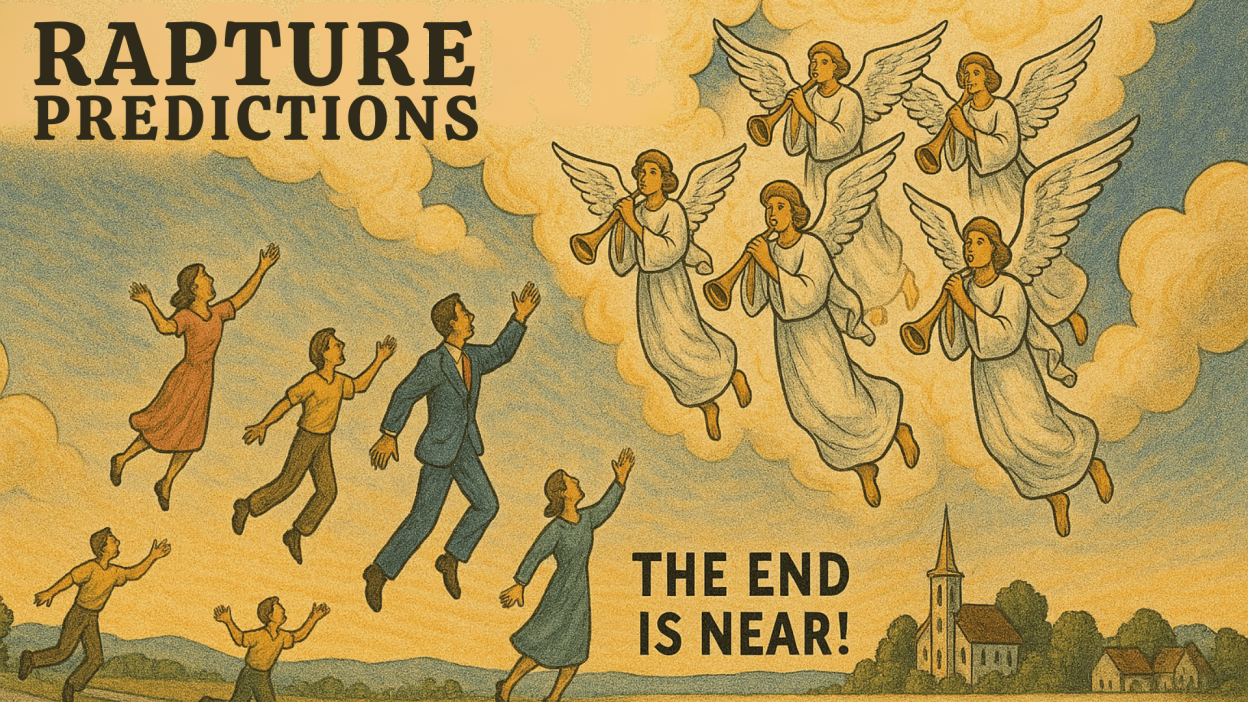Listen, I’ve been seeing the same posts you have. My phone has been buzzing with messages from worried friends, anxious parents, and confused young people about this “rapture happening September 23-27” thing that’s all over social media.
And honestly? My heart breaks a little. Not because I’m afraid they’re right (they’re not), but because we’ve been down this road so many times before, and it always ends the same way.
We Keep Falling for the Same Old Trick
Can I be honest with you for a minute? I get why these predictions grab our attention. The world feels crazy right now. Everything’s expensive, conflicts everywhere, and sometimes it feels like everything’s falling apart. When someone comes along with a specific date saying, “Jesus is coming back!” part of us thinks, “Finally! An escape plan!”
But friends—and I say this with all the love in my heart—we’re being played. And worse, we’re making the Gospel look foolish to people who desperately need it.
Let Me Tell You What Jesus Actually Said
Jesus couldn’t have been clearer. In Matthew 24:36, He stated plainly: “No one knows the day or hour, not even the angels in heaven, nor the Son, but only the Father.”
Did you catch that? Jesus Himself said HE didn’t know the timing during His earthly ministry. So when TikTok prophets or YouTube preachers claim they’ve cracked the code, they’re literally claiming to know something Jesus said was unknowable.
That’s not faith. That’s arrogance dressed up in religious clothes.
This Isn’t New—We’ve Been Here Before (Like, A Lot)
Let me share something that might shock you. There have been over 200 failed rapture predictions. Two hundred! And those are just the documented ones.
Remember Harold Camping? Poor guy spent $100 million—ONE HUNDRED MILLION DOLLARS—on billboards in 2011 telling everyone the world would end on May 21st. When May 22nd rolled around, many people had lost their life savings, quit their jobs, and destroyed their relationships. Some never recovered their faith.
Or how about 1988? A guy named Edgar Whisenant wrote a book called “88 Reasons Why the Rapture Will Be in 1988.” Sold 4.5 million copies. Churches were packed. People maxed out credit cards, thinking they’d never have to pay them back.
October 1988 came and went. You know what he did? Published “89 Reasons Why the Rapture Will Be in 1989.” I’m not making this up.
Here’s What Really Gets Me
Every time we fall for this stuff, we push people away from Jesus. Think about it—if your non-Christian coworker sees you posting about September 23rd being “the day,” and then September 28th rolls around and you’re both still at work, what have we accomplished?
We’ve made the beautiful message of Christ’s return into a punchline. We’ve turned hope into a joke.
Paul (the actual apostle Paul, not me) was dealing with this same nonsense 2,000 years ago. In his second letter to the Thessalonians, he basically had to tell them, “Guys, stop quitting your jobs and sitting around waiting for Jesus. That’s not what I taught you!”
So What Should We Do Instead?
Look, I believe Jesus is coming back. With my whole heart, I think it. But here’s the thing—Jesus told us exactly what to do while we wait: Love God, love people, make disciples, care for the poor, fight injustice, and live like the Kingdom of God is already breaking into this world.
You want to be ready for Jesus’ return? Stop trying to figure out when it is and start living like it could be today. But also live as if it might not be for another thousand years, because we have work to do.
Feed the hungry. Visit the lonely. Stand up for the oppressed. Share the Gospel with your actual life, not just your social media posts. Build something that lasts. Raise your kids. Do your job with integrity. Love your neighbors—yes, even the difficult ones.
A Personal Plea
If you’ve shared those September 23rd posts, it’s okay. We all get caught up sometimes. But can I challenge you? When September 28th comes (and it will), don’t just delete the posts and pretend nothing happened.
Own it. Say “I was wrong.” Show the world that Christians can admit mistakes. That kind of humility and honesty? That’s a testimony worth sharing.
And to my young friends especially—I know it’s tempting to want a dramatic exit from this messy world. But God put you here, right now, for a reason. Your generation has work to do, love to spread, and hope to bring. Don’t let fear-mongers steal your purpose.
The Bottom Line
The unity of the Spirit that Ephesians 4 talks about doesn’t come from everyone believing the same conspiracy theory or rapture date. It comes from focusing on what actually matters: Christ crucified, risen, and coming again—someday.
Not September 23rd. Not September 27th. But someday.
And until that day, we’ve got a job to do.
Stay faithful. Stay hopeful. But please, please stop setting dates.
One Last Thing (And This Is Important)
Before you close this tab, I need you to hear this: Don’t quit your job tomorrow. Don’t drop out of school. Don’t ghost your relationships. Don’t max out your credit cards.
I know that sounds obvious, but you’d be surprised how many people I’ve watched throw away their futures because someone on the internet convinced them there wouldn’t be one. That college degree you’re working on? Finish it. That relationship you’re building? Nurture it. That career you’re developing? Pour yourself into it.
Here’s the beautiful paradox of following Jesus: We live with eager expectation that He could return today, while also planting trees we may never see fully grown. We save for retirement while singing “Soon and very soon, we are going to see the King.” We teach our kids to tie their shoes even as we teach them that Jesus is coming back.
You know what’s way more powerful than posting rapture predictions? Your coworker is watching you live with integrity when nobody’s looking. Your classmate sees you serving others without needing credit. Your neighbor is experiencing the love of Christ through your ordinary, everyday kindness.
God’s given you a blueprint, and it’s not a bunker-building manual—it’s the Great Commission. Make disciples. Not just on September 22nd in a panic, but on September 28th when life goes on. In October, when everyone’s forgotten about this. Next yea,r when there’s a new date everyone’s freaking out about.
The Kingdom of God advances through faithful people doing faithful things over the course of long periods of time. Through students who study hard because their excellence honors God. Through employees who work with integrity because their Boss is ultimately in heaven. Through friends who keep showing up because love doesn’t set expiration dates.
So tomorrow morning? Set your alarm. Make your coffee. Go to work or class. Love your family. Check on your neighbor. Share Jesus with your life, not just your lips.
Whether Jesus comes back tomorrow or in a thousand years, this is how we’re found faithful—not standing on a mountain in white robes, but with dirt under our fingernails from serving, building, and loving in His name.
Your brother in this beautiful journey of faith,
Paul
Sources for Verification:
PRIMARY SOURCE: THE BIBLE
The foundation of everything I’ve shared comes from God’s Word itself:
Matthew 24:36 – “But about that day or hour no one knows, not even the angels in heaven, nor the Son, but only the Father.”
- Jesus explicitly tells us that date-setting is impossible. This isn’t a puzzle to solve—it’s a boundary God has set.
Acts 1:7 – “It is not for you to know the times or dates the Father has set by his own authority.”
- When the disciples themselves asked Jesus about timing, He redirected them to their mission, not dates.
2 Thessalonians 2:1-3 – “Concerning the coming of our Lord Jesus Christ and our being gathered to him, we ask you, brothers and sisters, not to become easily unsettled or alarmed by the teaching allegedly from us—whether by a prophecy or by word of mouth or by letter—asserting that the day of the Lord has already come.”
- Paul dealt with this exact same problem. False rapture timing has been confusing believers for 2,000 years.
1 Thessalonians 5:2-6 – “For you know very well that the day of the Lord will come like a thief in the night… So then, let us not be like others, who are asleep, but let us be awake and sober.”
- We’re called to readiness through faithful living, not date predictions.
Matthew 24:44 – “So you also must be ready, because the Son of Man will come at an hour when you do not expect him.”
- If we could predict it, this verse wouldn’t make sense. The unexpected nature is part of God’s plan.
Luke 21:8 – “Watch out that you are not deceived. For many will come in my name, claiming, ‘I am he,’ and, ‘The time is near.’ Do not follow them.”
- Jesus specifically warned us against people claiming to know “the time is near.”
2 Peter 3:10-12 – “But the day of the Lord will come like a thief… Since everything will be destroyed in this way, what kind of people ought you to be? You ought to live holy and godly lives.”
- Peter emphasizes how we live, not when it happens.
SECONDARY SOURCES: Historical Documentation & Scholarship
These sources verify the pattern of failed predictions throughout history:
Books & Scholarly Works:
- When Time Shall Be No More by Paul Boyer (Harvard University Press, 1992) – Documents American prophecy belief from 1600s-present
- The End of the World: A History by Otto Friedrich (Fromm International, 1986) – Comprehensive history of failed predictions
- Apocalypse Delayed by M. James Penton (University of Toronto Press, 1985) – Documents Jehovah’s Witnesses’ failed predictions
- The Great Disappointment by Francis D. Nichol (Review and Herald, 1944) – Primary source on Millerite movement
Academic Articles:
- “Millenarianism in American Religious History” – Journal of American History, Vol. 71, No. 3
- “Failed Prophecy and Group Dynamics” – American Journal of Sociology, Festinger et al., 1956
Historical Documentation:
- Harold Camping’s Family Radio archives and public statements (2011-2012)
- Edgar Whisenant’s published works (1988-1994) – Library of Congress catalog
- William Miller’s original pamphlets – American Antiquarian Society archives
Biblical Scholarship:
- D.A. Carson, Matthew: The Expositor’s Bible Commentary (Zondervan, 1984)
- N.T. Wright, Surprised by Hope (HarperOne, 2008)
- Ben Witherington III, Jesus, Paul and the End of the World (IVP Academic, 1992)
Primary Historical Church Documents:
- The Didache, Chapter 11 (60-120 AD) – Early church document on false prophets
- Augustine’s City of God, Book 18 (426 AD) – Against date-setting
- Luther’s Table Talk – Warning against apocalyptic calculations



